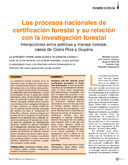Mostrar el registro sencillo del ítem
Los procesos nacionales de certificación forestal y su relación con la investigación forestal Interacciones entre políticas y manejo forestal, casos de Costa Rica y Guyana
| dc.contributor.author | Louman, Bastiaan | |
| dc.contributor.author | Campos, José Joaquín | |
| dc.contributor.author | Schmidt, Susanne | |
| dc.contributor.author | Zagt, Roderick | |
| dc.contributor.author | Haripersaud, Padmattie | |
| dc.date.accessioned | 2021-03-03T17:56:25Z | |
| dc.date.available | 2021-03-03T17:56:25Z | |
| dc.date.issued | 2002-01 | |
| dc.identifier.issn | e-ISSN: 1021-0164 | ISSN |
| dc.identifier.uri | https://repositorio.catie.ac.cr/handle/11554/10370 | |
| dc.description | 6 páginas, 1 tabulación, 13 referencias. | es_ES |
| dc.description.abstract | La certificación forestal comenzó como un mecanismo para transferir los costos de un buen manejo forestal desde los responsables del manejo a los consumidores de los productos. No siempre ha sido exitosa. Sin embargo, la certificación tiene otros beneficios. Uno de los principales ha sido su papel para facilitar discusiones sobre manejo forestal sostenible entre los diferentes actores afectados. Asumiendo este papel, también podría funcionar como interface entre investigación forestal por un lado y políticas y el manejo forestal por otro. El presente artículo describe este papel de interface con base en experiencias en Costa Rica y Guyana, donde se empezó con la selección de un esquema de certificación, seguido por el desarrollo de un estándar nacional de certificación. El estándar se construyó sobre los resultados de investigaciones anteriores. Además se utilizaron resultados de investigaciones recientes para discutir y adaptar propuestas de manejo y políticas. El proceso del desarrollo del estándar nacional ayudó a identificar lagunas en nuestro conocimiento actual sobre el manejo y sus efectos en su ambiente natural y humano, tanto como identificar debilidades en políticas y legislación forestal en ambos países. | es_ES |
| dc.description.abstract | Forest certification was set up as an instrument to transfer costs of sound forest management from forest owners to consumers. This has not always been sucessful. It has, however, other benefits as well. A major benefit has been its role as facilitator for discussions between diff e r e n t stakeholders. As such it may also serve as interface between research and forest policies and management. This article describes how in Costa Rica and Guyana the process of choosing for a certification scheme and later developing a national certification standard has played this role, building upon research work in the past and using recent research results to discuss and adapt management and policy proposals. It also identified gaps in our current knowledge of forest management and its effects on the natural and human environment, as well as weaknesses in policy and legislation. | |
| dc.language.iso | es | es_ES |
| dc.publisher | Centro Agronómico Tropical de Investigación y Enseñanza (CATIE), Turrialba (Costa Rica) | es_ES |
| dc.relation.ispartof | Revista Forestal Centroamericana Número 37 (enero-marzo 2002). páginas 41-46 | |
| dc.rights | info:eu-repo/semantics/openAccess | |
| dc.subject | ORDENACION FORESTAL | es_ES |
| dc.subject | ORDENACION DE RECURSOS | es_ES |
| dc.subject | POLITICA FORESTAL | es_ES |
| dc.subject | CERTIFICACION | es_ES |
| dc.subject | INVESTIGACIONES | es_ES |
| dc.subject | PROYECTOS DE INVESTIGACION | es_ES |
| dc.subject | PARTICIPACION DE LA COMUNIDAD | es_ES |
| dc.subject | PARTICIPACION COMUNITARIA | es_ES |
| dc.subject | COSTA RICA | es_ES |
| dc.subject | MANEJO FORESTAL | es_ES |
| dc.subject | CERTIFICACION FORESTAL | es_ES |
| dc.title | Los procesos nacionales de certificación forestal y su relación con la investigación forestal Interacciones entre políticas y manejo forestal, casos de Costa Rica y Guyana | es_ES |
| dc.title.alternative | Research and the national forest certification processes in Costa Rica and Guyana | es_ES |
| dc.type | Artículo | es_ES |


